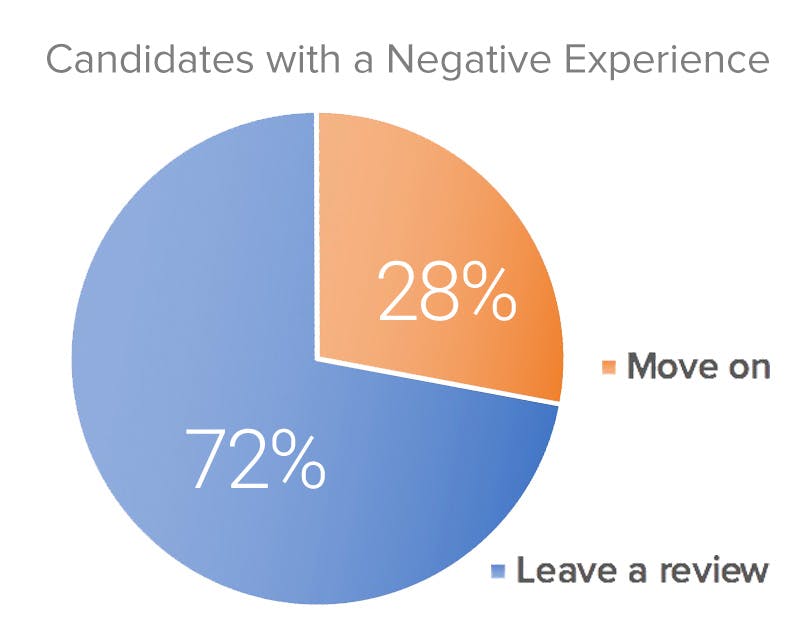COMPANIES WHO TRUST US TO HELP THEM FIND TALENT







Top Talent, Your Brand & Nailing The Candidate Experience
by Jessica Stielau
55% of applicants will simply avoid a company after reading a few bad reviews.Candidate experience is the way a candidate perceives your organization through their interactions with your team and brand during the recruiting and hiring process. Companies can’t afford for candidates to have sub par experiences during the interview process and expect to win.
Did they like the recruiter and the team? Were people organized? Did they feel their time was valued and respected? Did the product, problems or mission resonate with them? Is this an organization they want to be a part of?
Candidate experience is the difference between getting the hire you want and seeing your candidate walk away and take another offer.
The recruitment process provides you with multiple opportunities to craft your candidate experience. Each stage where a candidate interacts with your brand is an opportunity to get it right:
- Sourcing
- Screening
- Interviewing
- Hiring
- Onboarding
If you drop the ball at any one of these stages, you risk losing out on an exemplary candidate who can easily decide to take their talents elsewhere.
How Important is Candidate Experience?
Candidate experience is just one element in the interview process but it’s the glue that holds all the factors together. According to a study by Future Workplace, 72% of candidates who have a negative candidate experience will write about it on review websites like Glassdoor. Candidate experience isn’t only important for the candidates you want to hire – your goal should be to have every candidate have a good experience.
Even if you wouldn’t hire them – they should leave the recruiting process wanting to work for you.
When you also consider that 60% of job seekers report having a negative candidate experience and that they read an average of six reviews before applying to a given company, you can see how this could turn into a problem. In fact, 55% of applicants will simply avoid a company after reading a few bad reviews.
But, what makes a candidate experience good or bad? What have you done right to attract top candidates and what might you have done wrong to turn them away? We’ll discuss a few of these things below.
The Job Description is also a Job Ad
For most candidates, the job description is the first impression of your company. It should not only describe the role but also serve as advertisement for why a candidate would want the role. Avoid creating a description filled with empty phrases, terms, or jargon like “passionate” or “self-starter” can turn candidates away. There are no jobs that are looking for lazy, passionless, and unmotivated couch potatoes.
The description should also be written with clarity in mind. Give an appropriate and concise explanation of job requirements, responsibilities, and expectations.
A LinkedIn study noted that 94% of interviewees actually enjoy receiving feedback from hiring managers.You should also avoid listing every quality or skill you might want a candidate to possess. List only the skills that are absolutely necessary to perform the job, otherwise you might lose out on some high-quality candidates who aren’t all-knowing unicorns by means of them feeling under-qualified.
Streamline The Process
Whether you candidate pipeline comes to you from advertising or is sourced by a recruiter, the process of getting from interested to hired needs to be a give and take.
When candidates are filling out an application or doing an interview with someone on their team they are giving you their time to answer your questions – make sure that you flip that script and take time to answer their questions as well and tell them more about the company and the role. Though it’s tempting to internal resources time by asking candidates to spend more time up front filling in detailed applications or take home tests to weed out people who are unmotivated or not up to snuff, you might also be weeding out ideal candidates who don’t have the time or desire to fill out long, complex applications.
In fact, a CareerBuilder study noted that 60% of job seekers will simply quit an application if it is too long and/or convoluted. You could lose out on good candidates that way. Other ways to improve your application process include:
- Making sure the instructions are clear and uncomplicated
- Keeping the application on one page (even if it is a bit long)
- Making sure the process isn’t time-consuming
- Optimizing for mobile
- Allowing larger file upload sizes or providing a space for URLs
- Sending an email to confirm the receipt of the application
All of these can help improve your candidate experience dramatically.
Keep Candidates Informed Whether or Not You Hire Them
One of the more important candidate experience statistics is that more than two thirds of applicants expect to receive some kind of communication after submitting an application. The general lack of communication after an application has been submitted is also the number one gripe among job seekers. As a business, you may not feel as if you have the time to respond to every applicant. But, you will hurt your candidate experience by leaving people in the dark.
General guidelines for response time:
- Applicants should hear from you at least once per week even if you’re just letting them know that they are still being considered.
- Candidates you or your recruiters have contacted (sourced candidates) should hear back from you following any interview stage within 24 hours.
- Follow up interviews should take place within 5 business days of the previous interview step.
Keep in mind that any candidate you declined could still be a customer or a high-performing employee at a future date. Applicants who feel as if the application process is transparent are 3.5x more likely to apply to positions at your company should the opportunity arise again.
Give Good Interviews
An interview that starts late or seems disjointed can turn off high-quality candidates. Yes, those candidates are trying to market themselves as high-quality employees, and they will likely be nervous. But, if your hiring manager comes to an interview unprepared, good candidates may sign on the dotted line elsewhere.
Giving good interviews is a process that begins even before you’ve asked a question. Be upfront about the time the interview starts, its duration, who will be administering it, and what someone can generally expect from it.
You also want to be prepared with valuable interview questions and respect your candidate’s time by starting the interview promptly and ending it when you said you would. After the interview, consider providing feedback either in person or through email. A LinkedIn study noted that 94% of interviewees actually enjoy receiving feedback from hiring managers.
Final Thoughts
Having a good candidate experience is a vital step to attracting good candidates. New hires will likely spread the word about your candidate experience either by word of mouth or through review sites. At the end of the day, you want to nurture your candidates and foster a relationship with them because you never know when their talents will come in handy.

“The Sourcery is always there when we need them. They can scale up or down in response to demand. The Sourcery doesn’t take a success fee. We only talk to pre-screened candidates who fit what we’re looking for.”
— Jared Friedman
(CTO & Co-Founder at Scribd)

“We knew we needed help. We decided we might as well try this recruiting thing. We were able to hire a string of engineers in a very short time. The Sourcery took a ton off our plates immediately. Like In-House Recruiters, but better... It's hard to juggle the work to build the product and hit the milestones while also managing the hiring process.”
— Zack Rosen
(Co-founder & CEO of Pantheon)


“They Made Me a Better Recruiter. Over the years, I’ve placed more than 20 software engineers through The Sourcery. They do a fantastic job of minimizing hiring overhead. I was okay at recruiting before I met them. Now I actually consider myself a pretty good recruiter.”
— John Witchel
(Tech co-founder )
No contingency fees, no flooding your inbox with off target resumes
Every client is unique, just as every role and candidate is unique. Let’s connect, we want to understand your needs and share how we can help spin up a winning team for you.
Speak to a USA based representative now by calling us at 925-951-3730 or schedule a consultation to speak to us this week about your hiring strategy.
"We were able to hire a string of engineers in a very short time. The Sourcery took a ton off our plates immediately. Like In-House Recruiters, but better... It's hard to juggle the work to build the product and hit the milestones while also managing the hiring process."

Zach Rosen
Co-founder & CEO, Pantheon







